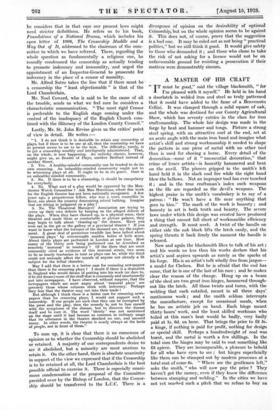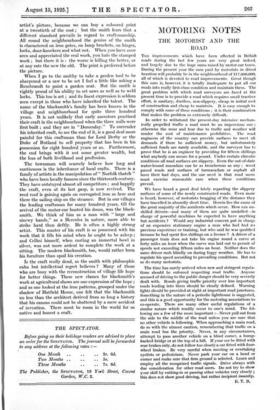A MASTER OF HIS CRAFT
" TT must be good," said the village blacksmith, " for YY I'm pleased with it myself." He held in his hind a doorlatch in welded iron and steel so truly patterned that it could have added to the fame" of a Benvenuto Cellini. It was clamped through a solid square of oak, and the whole was destined for our County Agricultural Show, which has seventy entries in the class for iron craftsmanship. The whole fair' design was made in the forge by heat and hammer and tongs. Picture a strong steel spring, with an attractive curl at the end, set at an acute angle with the main iron band and imagine what artist's skill and strong workmanship it needed to shape the pattern in one piece of metal with no other tool than is used for shoeing a horse. Every detail of the decoration—none of it " unessential decoration," that crime of lesser artists—is honestly hammered and bent on the anvil. The pincers gripped in the smith's left hand held it in the slack coal fire while the right hand blew the bellows. Not an improper tool has ever touched it ; and in the true craftsman's index such weapons as the file are regarded as the devil's weapons. The highest praise in the smith's vocabulary is to say of a patron : " He won't have a file near anything that goes to him." The mark of the work is honesty ; and honesty in art is both truth and beauty. The severe laws under which this design was created have produced a thing that cannot fall short of workmanlike efficiency and strength. It must work. A twist of the handle on either side the oak block lifts the latch easily, and the spring thrusts it back firmly the moment the handle is released.
Now and again the blacksmith likes to talk of his art ; and his words no less than his works declare that his artist's soul aspires upwards as surely as the sparks of his forge. His is an artist's talk wholly free from jargon— a model for Chelsea. But he is afraid that the end has come, that he is one of the last of his race ; and he makes clear the reason of the change. Hung up on a beam of the shed are two great iron hinges, hammered through- out like the latch. All those twists and turns, with the welding that each entailed, meant in all three days', continuous work ; and the smith seldom interrupts the manufacture, except for occasional meals, when he has an artistic job on hand. Each hinge meant thirty hours' work, and the least skilled workman who toiled at this man's heat would be badly, very badly paid at ls. 6d. an hour. That brings the price to £2 5s. a hinge, if nothing is paid for profit, nothing for design or special skill. Perhaps a hundredweight of coal was burnt, and the metal is worth a few shillings. In the total sum the hinges may be said to cost something like £8 apiece. They are incomparable, a pleasure to behold for all who have eyes to see ; but hinges superficially like them can be stamped out by modern processes at a total cost of some 6s. " Where are the gentlemen left," asks the smith, " who will, now pay the price ? They haVen't got the money, even if they know the difference between stamping and welding." In the cities we have not yet reached such a pitch that we refuse- to buy an artist's picture, because we can buy a coloured print at a twentieth of the cost ; but the smith fears that a different standard prevails in regard to craftsmanship.
All round the neighbourhood the genius of the smith is charactered on iron gates, on lamp brackets, on hinges, locks, door-knockers and what not. When you have once seen and appreciated the real work, you hate the stamped work ; but there it is : the worse is killing the better, or at any rate the new the old. The print is preferred before the picture.
When I go to the smithy to take a garden tool to be sharpened or a saw to be set I feel a little like asking a Rembrandt to paint a garden seat. But the smith is rightly proud of his ability to set saws as well as to weld locks.. This too is art ; and its finest expression is seldom seen except in those who have inherited the talent. The name of the blacksmith's family has been known in the village and neighbourhood for quite three hundred years. It is not unlikely that early ancestors practised their craft in the neighbourhood when the three mills were first built ; and they are in " Domesday." To surrender his inherited craft, to see the end of it, is a good deal more painful for this craftsman than for Lord Derby or the Duke of Rutland to sell property that has been in his possession for eight hundred years or so. Furthermore, the end brings with it not some greater wealth, but the loss of both livelihood and profession.
The townsman will scarcely believe how long and continuous is the inheritance of local crafts. There is a family of artists in the manipulation of " Norfolk thatch " who have been locally famous since the thirteenth century. They have outstayed almost all competitors ; and happily the craft, even at its last gasp, is now revived. The reed roof is gaining again on corrugated iron as here and there the sailing ship on the steamer. But in our villages the leading craftsman for many hundred years, till the arrival of the motor-car hooted his doom, was the black- smith. We think of him as a man with " large and sinewy hands," as a Hercules in nature, more able to strike hard than deftly. He is often a highly strung artist. This master of his craft is so possessed with his work that it fills his mind when he ought to be asleep ; and Cellini himself, when casting an immortal bowl in silver, was not more ardent to complete the work at a sitting. The modern blacksmith, too, would rather burn his furniture than spoil his creation.
Is the craft really dead, as the smith with philosophic calm but intellectual regret believes ? Many of those who are busy with the reconstruction of village life hope for better things. These new classes for blacksmith's work at agricultural shows are one expression of the hope ; and as one looked at the iron patterns, grouped under the shadow of Hatfield House, one felt that the blacksmith no less than the architect derived from so long a history that his canons could not be shattered by a mere accident of invention. There must be room in the world for so native and honest a craft.







































 Previous page
Previous page